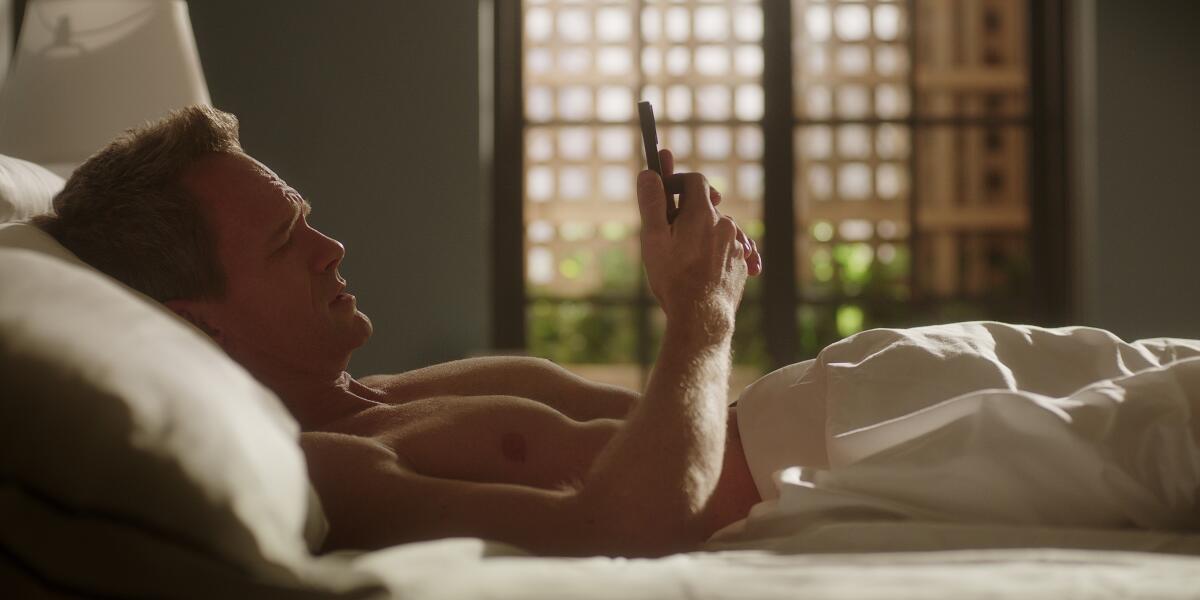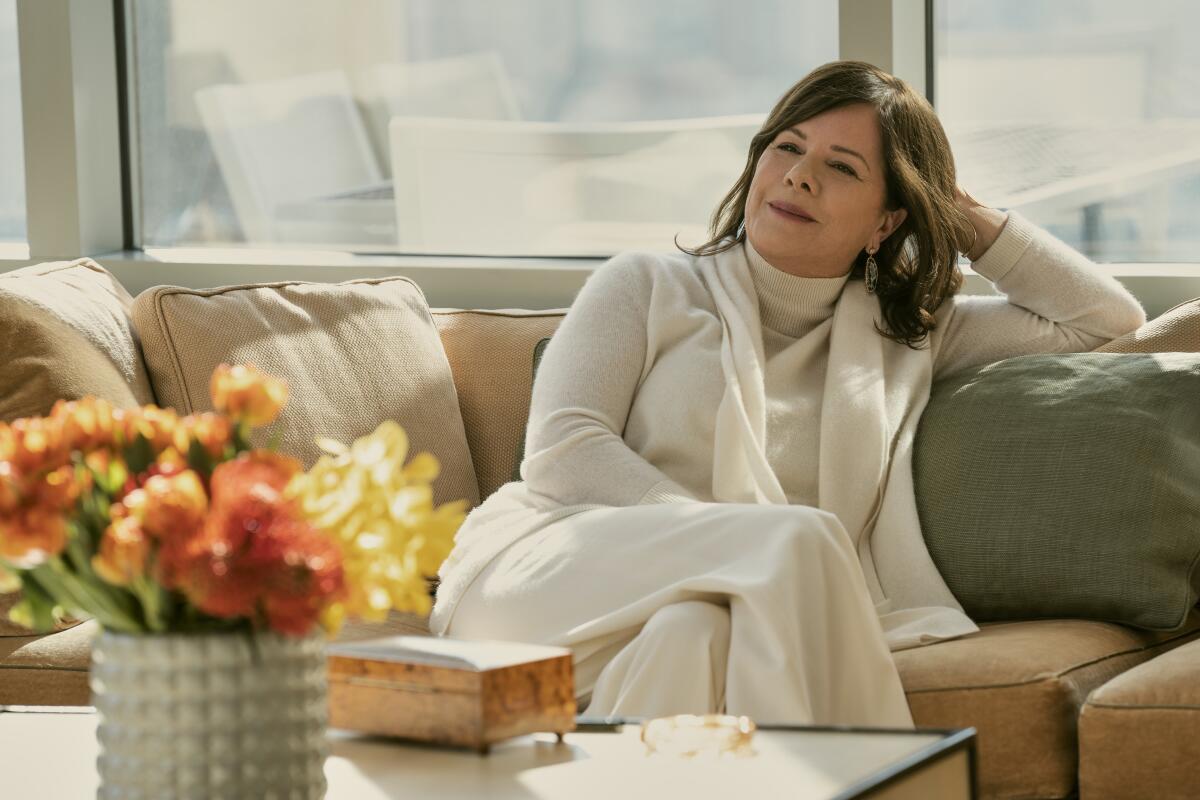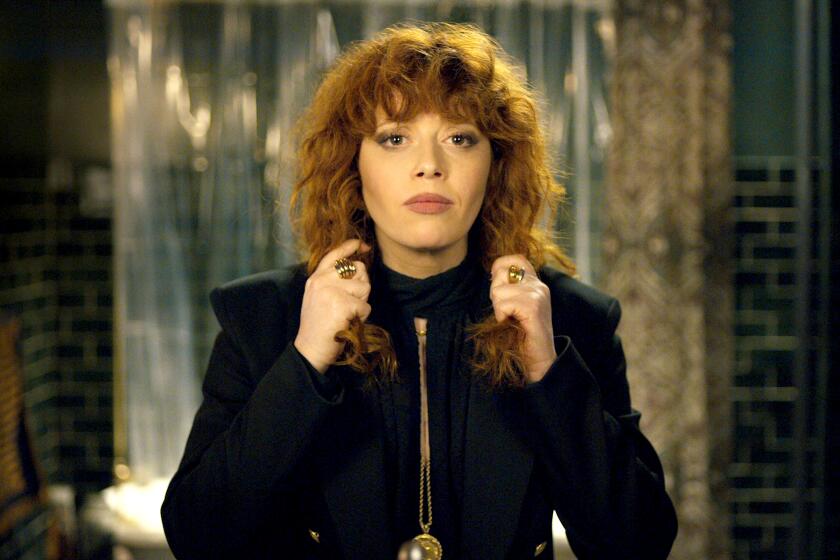Netflix’s ‘Uncoupled’ is a sweet, grown-up sitcom. But its New York is for the rich

- Share via
With “Uncoupled,” premiering Friday on Netflix, Darren Star (co-creating with “Modern Family” vet Jeffrey Richman) offers up another urban lifestyle fantasy. One can think of it as the third in a New York trilogy beginning with Star’s “Sex and the City” and “Younger,” or a tetralogy if we include the short-lived 1995 prime-time soap “Central Park West.” But let’s call it a trilogy.
Like “Younger,” in which Sutton Foster played a 40-year-old woman passing for someone in her 20s, it begins with a midlife breakup. Neal Patrick Harris stars as 40-something Michael, whose partner of 17 years, Colin (Tuc Watkins), tells him he’s moving out just as they’re about to enter the elaborate surprise party Michael has arranged for him. (Colin is turning 50; this is a story in which all the main characters are middle-aged.) Michael will spend the remainder of the eight-episode first season obsessing, trying to move on, obsessing some more, falling flat on his face (literally, in a nice bit of slapstick) and getting up again. (There is also a choice bit of him going downhill on skis, backwards.)
Michael is a high-end residential real estate broker; the mighty Tisha Campbell plays his friend and business partner, Suzanne. (His other significant friends are art dealer Stanley, played by Brooks Ashmanskas, and TV weatherman Billy, played by Emerson Brooks.) The properties they deal with tend to be modern and charmless, in a way that spells money. (You are probably meant to find them impressive.) The interpolated shots of the city favor new glass towers over venerable landmarks.
We surveyed The Times TV team to come up with a list of the 75 best TV shows you can watch on Netflix. As in, tonight.
“I feel like I’m in one of those 1930s movies where the Depression is happening outside, but up here it’s just Fred Astaire and cocktails and soirées,” Michael says, viewing the apartment of Claire (Marcia Gay Harden), whose recent abandonment mirrors Michael’s. Yet this is true of nearly the entire series, if not the whole of Star’s oeuvre, in which even the bohemians are glamorous. His Manhattan, here a place of terraced penthouses, fancy restaurants and exclusive clubs, is scrubbed clean of the least sign of poverty or even middle-class life — as does seem to be the actual plan in a place where the average rent recently reached $5,000. (“I remember Hell’s Kitchen when you couldn’t walk west of 9th Avenue without getting knifed,” says Stanley. “Now it’s Chelsea, with better gays.”)
Everyone here is well-off, though some are more fabulously wealthy than others. We are to understand Michael, who works on commission and is constantly hustling, as a kind of working stiff; still, when we see him walking out of an ordinary drugstore and into a “meet cute,” it feels for an instant as if we’ve entered a different series, and one we might like to stay in a little longer.

As is common in Star’s shows (also including “Emily in Paris”), characters often find themselves meeting at private parties and exclusive events — an art opening, a roller disco fundraiser, a Central Park fundraiser, a celebration of the city’s most eligible men, a bris, a wedding, a poker game. And of course that exposition-rich opening surprise party, which includes a performance by Tony-winning composers Marc Shaiman and Scott Wittman (“Hairspray”).
Inevitably, it will be suggested that the cure for lost love is sex — that is the custom in television — and thus we are treated to the 100th iteration of the “first time on a dating app” scenario. There is a lot of penis talk. But the explicit message is that sex is only sex; human connection, whether friendship or durable romantic love, is what matters. The lovelorn Stanley (“You do not want to be gay and single in this town at our age — you’re invisible”) and sexual butterfly Billy (“I think it gets better with age — the number of young guys who want to hook up with an older man is ridiculous”) put a dialectical frame around Michael, who is far from invisible but is not exactly on the prowl. His (comparatively) older-generation conservatism and his own proper nature keep him from diving headlong into hooking up, though he does wade in a little — and so, while there is sex, there is also refused or interrupted sex. (And because it’s funnier that way, one would hazard.) His wanting something more is what keeps “Uncoupled” a sweet, grown-up entertainment.
The complete guide to home viewing
Get Screen Gab for everything about the TV shows and streaming movies everyone’s talking about.
You may occasionally receive promotional content from the Los Angeles Times.
Harris fits the part so well that one would imagine it was written for him. He retains some of his Doogie Howser boyishness, but he’s attractively weathered — the worry furrows in his brow serve the part admirably — and this accords with Michael’s middle-aged naïveté. (He’s buff, though, as is every man with whom he hooks up or almost hooks up; indeed, apart from the soft-edged Ashmanskas and the lithe André de Shields as Michael’s neighbor, the actually elderly Jack, buffness is practically taken for granted.)
Still, this is not a one-man show. If not exactly a “Sex and the City”-style ensemble piece, given that the emotional focus is mainly on Michael, Billy and Stanley and especially Suzanne do get some individual storylines, and Claire becomes a more interesting character as she emerges as something like a new, needy friend. The supporting cast is strong. As Stanley, the Tony-nominated Ashmanskas makes a deep impression doing nothing in the least flamboyant; De Shields has the season’s most moving monologue and Campbell its best-delivered laugh line, “I know you’re mad, honey, but we’re going to need that stapler.” (You’ll have to watch for context.)
As a straightforward romantic sitcom centered on gay men, “Uncoupled” is still a rarity for television, even for Star, who has been out forever — though that has more to do with the historical temerity of Hollywood than it does with the creator. Star has made a point of noting the story could be anyone’s, which is true enough and good business, even as there are plenty of references that are specific to the community — as when, confronted with a younger man who doesn’t want to wear a condom and has never heard of the AIDS quilt, Michael wails, “Oh my God, you millennials. Don’t you know where we came from, where you got your freedoms? Don’t you know what people like me — well not me, a little bit older, but I’ve seen ‘Angels’ — don’t you know what we sacrificed for you?” It’s that combination of specificity and universality that makes “Uncoupled” feel at once kind of radical and quite relatable.
‘Uncoupled’
Where: Netflix
When: Any time, starting Friday
Rating: TV-MA (may be unsuitable for children under the age of 17 with an advisories for coarse language, nudity and smoking)
More to Read
The complete guide to home viewing
Get Screen Gab for everything about the TV shows and streaming movies everyone’s talking about.
You may occasionally receive promotional content from the Los Angeles Times.








